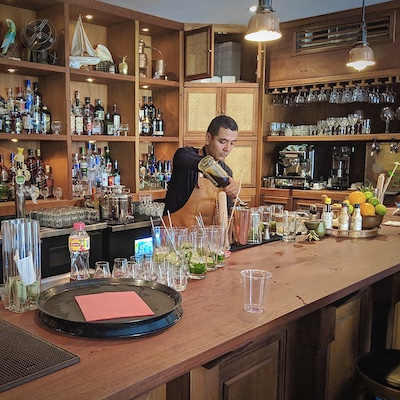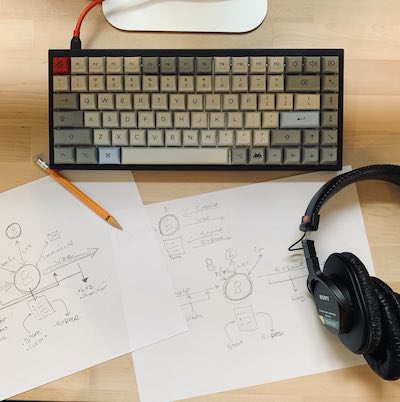👋 I'm curently looking for a new role. Hire me!
I've been trying to write this post for about a year now. Each time I start, the core of what I'm trying to say somehow slips away as I try to say it. I'll take a break from it, come back, and have to start over. This is the fifth time I've restarted and I feel ridiculous that I can't just get the words out.
Here's what I want to you to know:
Whether you're just getting started or a seasoned veteran, we need you. We need your experiments and your questions and your feedback. Your lack of understanding is a valuable attribute that goes away as you gain experience. Ask all the questions and give all the feedback because we're all better off for it. Your courage will be rewarded.
That feels better. Now, let me tell you why I know this is true.

We all have a sense in our head about how "good" we are at the things we do. I like to ride bicycles and I like to keep those bicycles in good shape so I've learned some basic maintenance skills over the years. All of the bicycle drivetrains in our house are squeaky clean and well oiled, our tires are the correct pressure, and everything shifts well. I have most of the tools I need and I know when it's time to call the professionals at our LBS (local bike shop). I would put myself at the low end of intermediate for this skill.
When you're intermediate, it's not hard to see the value you bring. You can get things done and others might turn to you for your skills (I'm the unofficial neighborhood bike mechanic). You also know where to turn to for help when you get stuck, like the best YouTube channels or escalation paths (thanks Adam). You can look back to see how far you've come and look forward to all the new skills you can learn.
But, when you're just getting started, it's hard to see what you have to offer. It took me almost 4 hours to tune my first rear derailleur, which ended in near complete failure. 4 more hours the next day and I got it, for the most part. The next time the bike was at the shop, the mechanic gave me a funny look and asked who worked on it last. I can't recall if I told the truth of not.
I've been getting better at this skill over the years but, in the beginning, it was mostly pain and suffering. I would text my friend pictures and questions when I got truly stuck (thanks Adam) and would often be up late at night just trying to get things working before a trip the next day. My knowledge is hard-earned and, now, I'm glad I don't end most sessions bleeding or ready to give up on cycling altogether.
It's hard to be a beginner.
You're slow and you mess up and you get frustrated. You might question your intelligence or agonize over repeated dumb mistakes, letting your self talk make a hard job even harder. You envy those who have gotten past this point and graduated to a higher level of skill. Worst case, you give up and leave this kind of work for smarter, more focused, more talented people. What good are you, anyways?
Hopefully your self-talk is less vicious than mine but I think we can all recall a time when we were trying to learn something or do something for the first time and remember feeling uncomfortable, embarrassed, frustrated, or all of the above. It can be a challenge to push through to the other side, let alone share our work and process along the way. Who wants to see our complete failures? Further, how could we stand to have our shortcomings on display?!
This is a big loss, both for you, as a beginner, and everyone else at all levels. When you're just getting started, you have an extremely valuable and short-lived perspective often called "beginner's mind." Your perspective on the road ahead, the world around you in this state, and how you took your first steps will, eventually, be lost forever as you learn more.
This temporary state of being comes with superpowers that are easy for us to overlook as we're floundering.
- You are naturally free from views and opinions that make it hard to learn more. As we become more experienced we become more set in our ways and driven to give our opinion rather than learn from others. More knowledge comes with more bias. "Without views, we listen more deeply and see more clearly."
- Your stumbling and experiments makes it easier for others to stumble and experiment. Sharing your mistakes and challenges encourages psychological safety, an environment that benefits everyone at all levels of experience.
- Your role as the student means someone else gets to play the teacher. Whether someone has a little knowledge or a lot, it feels great to share that with others and help them take a step forward. Sharing our experience also encourages correcting, expanding, and solidifying what we (think we) know.
- The answer to the question you're scared to ask will help others. As you reach higher and higher levels of experience, your hesitance to ask "dumb" questions will increase. As a beginner, you have a free pass to ask the questions that others might feel like they should already know. Your willingness to look stupid can be the rising tide that lifts all boats.
This is all well and good when we're talking abstractly but things get more complicated at work. Your level of experience at your profession is tied to the title you have, the responsibilities you're given, and your paycheck. The stakes are much higher when making mistakes and looking dumb could have a material effect on your career.
I don't have the answer to this. What I can say is that I have been a part of or a bystander to many, many people just getting started at a company or skill. Time after time, the ones that succeed and seem to enjoy the journey more are the ones that take their time, question what's around them, and let go of feeling dumb. I have learned new things myself and found my own beginner's mind with their help.
If you don't feel safe to ask questions and make mistakes at work, it might be time to find a place that you can.
As a beginner, you can embrace your beginner's mind by:
- Recognizing its value and acknowledging its transiency.
- Asking all of your good questions to your company, your team, or even just one person that you trust.
- Recognizing that asking someone to teach you is a gift to them.
- Remembering that we were all there at some point, even that one intimidating person.
Most developers seem intimidating when they talk about code because you lack the familiarity they have! It’s not because they’re smarter. It’s because they’ve spent absurd numbers of hours in a codebase you haven’t.
The world needs more people who are two days into learning something writing about the problems of people who are one day in.
As someone with more experience, you can help those getting started by:
- Encouraging questions and asking your own "dumb" questions.
- Embracing the teacher role by taking your time to educate others.
- If you don't have the time to give a great answer, saying so and coming back when you can.
- Telling the stories about your mistakes, disasters, and missteps.
< Links >
< Take Action >
Comment via:
Email › GitHub › Hacker News ›
Subscribe via:
< Read More >
Tags
Newer

Jan 04, 2022
Eleventy Custom Content Type Collections and Layouts
How-to on creating separate collections and layouts for a custom content type. In this case: cocktails!
Older

Nov 01, 2021
Taking Notes: Why and How
I've been writing for myself regularly for probably 15 years and have tried out many different systems and apps. Recently, I think I finally found the right one.